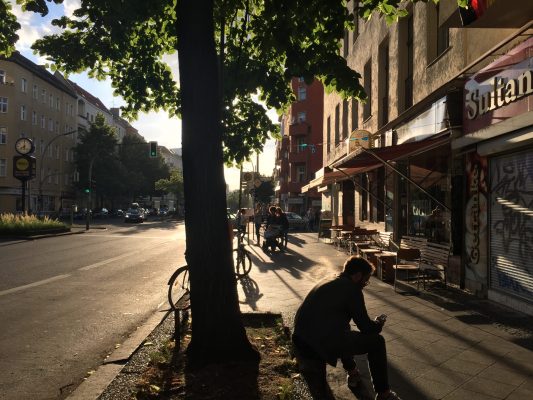In Germany, Syrians are facing uncertainty despite their successful integration
Advocacy team of France terre d'asile - Published on October 16, 2025
Almost a year after the fall of Bashar al-Assad’s regime in Syria, many asylum seekers and refugees who have fled the country now face uncertainty about their future in Germany, a country that had previously welcomed them. This comes despite the continuing fragility of Syria’s economy and security situation. The recent tightening of the German migration policy, implemented by Friedrich Merz’s conservative government, threatens to upend many lives and careers rebuilt in exile.
Hiba Obaid is a Syrian freelance journalist and writer of Palestinian origin based in Berlin. She works as an editor for Deutschlandfunk Kultur radio and runs the Sonnenallee podcast, which features interviews with members of the Syrian diaspora. She fled to Germany in 2012 after participating in anti-regime activities at the beginning of the Syrian revolution. Once settled in Berlin, she was able to pursue a career in journalism and has since obtained German citizenship.
Like many people of Syrian origin living in Germany, she feels torn about the idea of returning to Syria, even for a visit. The anticipated joy of returning to the country whose transformation she once took part in clashes with the images and memories of the civil war’s violence. Confronting these memories – rekindled by recent sectarian fighting – feels unbearable to her.
The arrival of a new government in Damascus on December 8, 2024, following a lightning offensive by opposition forces, opened a new chapter in Syria’s history. Nevertheless, peace remains fragile, and the new authorities face the immense challenge of rebuilding a country ravaged by more than a decade of war. The country’s economy is in tatters, and many returnees live in extreme poverty, often among the ruins of their destroyed homes. In several regions, the state is unable to provide even the most basic public services.
Tougher measures, threats and rising pressure to return
Germany’s migration policy has significantly toughened since Friedrich Merz’s Christian Democratic Union (CDU) government took office in May. The shift towards a more restrictive approach had already begun under Olaf Scholz’s Social Democratic government and is now being implemented through tighter border controls, facilitated deportations, and barriers to international protection – a trend visible across Europe.
These developments are taking place against the backdrop of the rise of the far right and its increasingly widespread anti-immigration rhetoric, which leaves the Syrian community facing growing uncertainty.
Since the fall of Bashar al-Assad’s regime, restrictive measures against displaced persons have multiplied. In January 2025, Social Democratic Interior Minister Nancy Faeser proposed revoking the international protection status of Syrian refugees “who do not have the right to stay for […] work or study, and who do not voluntarily return to Syria”. Since coming to power in May, Friedrich Merz’s government has ordered the pushback of all persons wishing to apply for asylum at the border. In June, the Bundestag approved the suspension of family reunification for holders of subsidiary protection – a status often granted to Syrians.
In July, at a summit of European Union interior ministers, German Interior Minister Alexander Dobrindt proposed mechanisms to facilitate the deportation of Syrians and Afghans. In early October, in the context of negotiations on the EU Return Regulation, Germany reiterated its desire to create a new European legal framework that would enable the establishment of return hubs outside the EU’s borders, allow indefinite detention, and impose permanent return bans.
At the same time, the hostile rhetoric of certain politicians continues to stigmatise third-country nationals. Jens Spahn, chairman of the CDU/CSU parliamentary group in the Bundestag, has repeatedly drawn a distinction in his public comments between ‘good’ and ‘bad’ refugees and asylum seekers, based solely on their employment status, their dependence on social services and their knowledge of German.
By targeting the rights of refugees and asylum seekers, Germany risks setting itself on a path towards becoming one of the most restrictive European countries in terms of asylum rules. This would mark a radical U-turn from 2015 – the year Germany opened its doors to refugees – and would come despite the successful integration of the millions of people welcomed into the country.
A largely successful integration
Germany is now home to nearly one million people of Syrian origin. Most of them arrived in 2015 to escape the civil war ravaging their home country. Angela Merkel’s open-door policy enabled Germany to take in nearly half of all Syrians arriving in Europe.

In ten years, they have integrated successfully into society, thanks in large part to an ambitious policy implemented by the Merkel government that accelerated learning of the German language and simplified access to the labour market. As a result, in 2024, the OECD ranked Germany among the European countries with the most developed integration frameworks. To date, more than 160,000 Syrians have obtained German citizenship.
According to a 2024 report by the Institute for Employment Research, nearly 68% of Syrian refugees were employed after eight or more years in the country – 86% of men and 33% of women. Most men work in the transport, logistics and food production sectors, while women are employed mainly in the health, education, social and sales sectors. They are often overqualified for their jobs at the beginning of their careers in Germany, but contribute significantly to filling labour shortages in sectors under pressure. This qualifications gap narrows with the number of years spent in the country.
Syrian doctors play a particularly important role in the German healthcare system, which is currently suffering from staffing shortages. More than 6,000 Syrian doctors work in Germany, often holding critical positions in rural areas. They represent the largest group of foreign doctors in the country.
Beyond their contribution to key economic sectors, many Syrian refugees have turned to entrepreneurship, starting their own businesses in areas such as catering, construction, and small retail. Their activities have helped bolster the job market and expand local services.
Integration into the education system has also been a success: more than 250,000 Syrian children are enrolled in public schools, and nearly 20,000 students are pursuing higher education degrees in 2025.
Nevertheless, amid rising anti-immigration rhetoric, many Syrians in Germany are questioning their future in the country. Nour Al Zoubi, who has lived in Germany for ten years and works as a social worker for the Thuringia Refugee Council in the city of Gera, reflects on the turbulence of the current political situation: “Sometimes I wonder if German politics will ever consider me part of this country. Or will I always be the refugee, the Muslim and the Syrian?” This is despite the fact that she and her child have been naturalised and she is actively involved in the political life of her hometown.
On another topic :
Malta: a breeding ground for a dangerous and repressive migration policy
Egypt adopts its first-ever asylum law, without improving the current system
